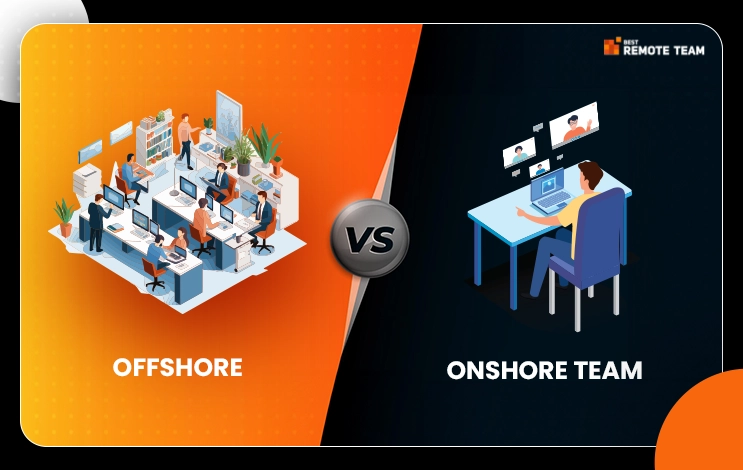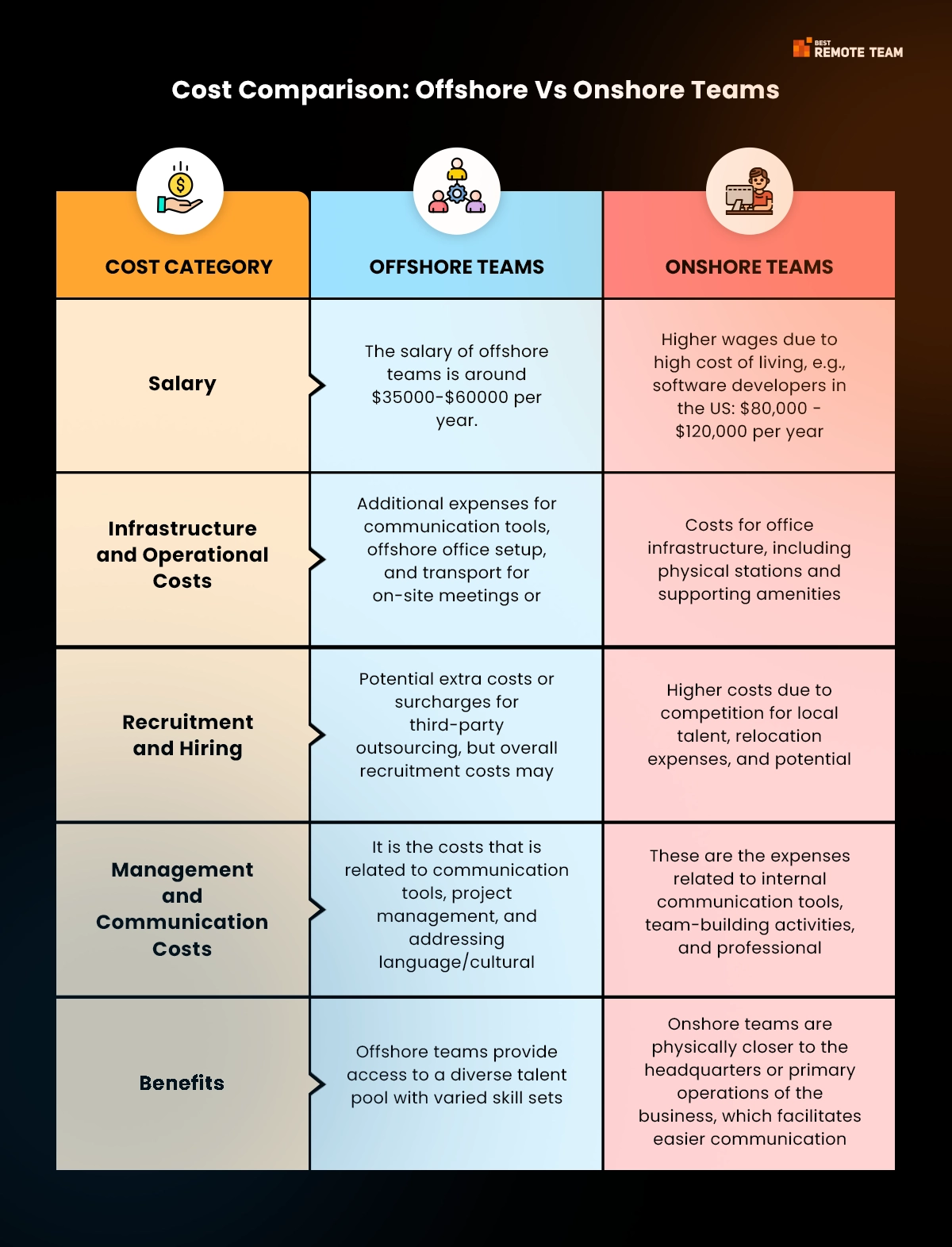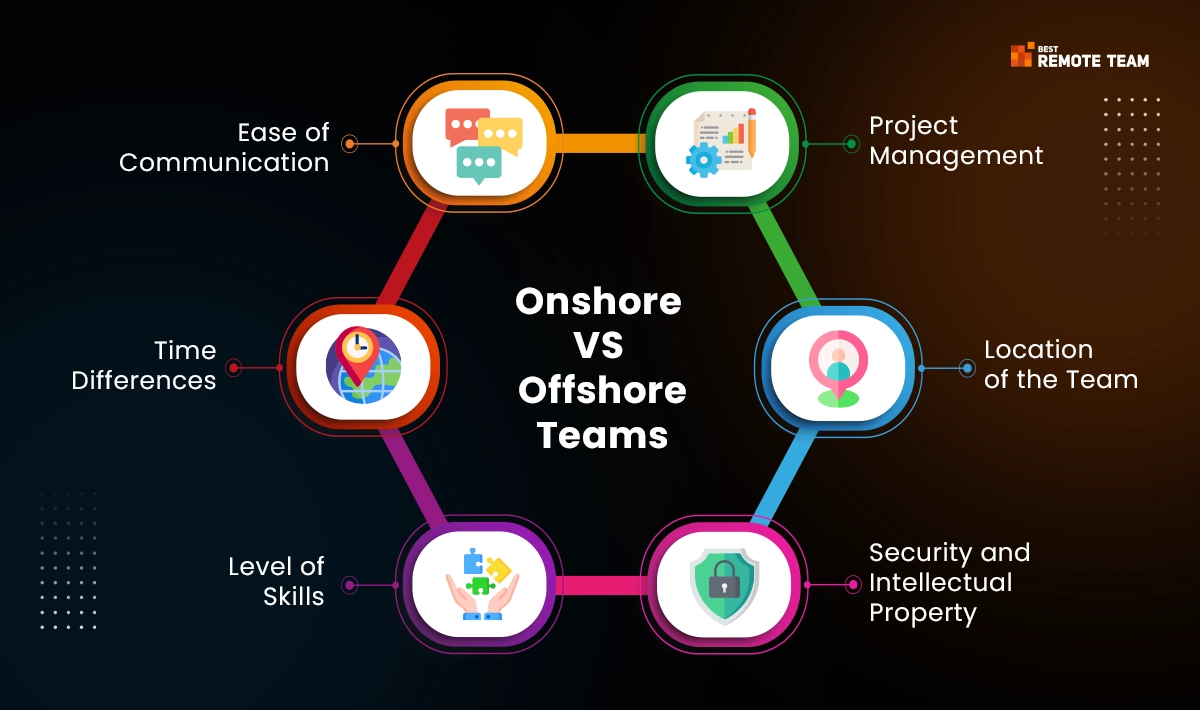What Are Offshore Teams?
Offshore teams mean using teams or persons from a different geographical location other than that of the company’s home country or where most of its operations are based. Such teams often function virtually due to technology and other organizational means for interacting with the client organization. Hire Offshore Developers to give an expert touch to your software development project.
Pros
1. Cost Savings
Project costs might be considerably decreased by using lower labor costs elsewhere.
2. Global Talent Pool
Reach out to more qualified professionals outside of your local area.
3. 24/7 Coverage
Progress can be made continuously using time zones staggered in work hours.
Cons
1. Communication Challenges
Language barriers & time zone differences can make teamwork difficult.
2. Cultural Differences
Different expectations and work styles might lead to misunderstandings.
3. Security Risks
Data security considerations may become more important when dealing with a team located abroad.
Challenges of Offshore Teams
1. Communication Barriers
However, there may still be times when some barriers to communication arise, even with the help of modern technologies, particularly in multinational or offshore software development projects. Language barriers also mean different time zones, different presentation skills, and different cultural ways of doing things, which can cause misunderstandings and delays.
2. Quality Control
It becomes relatively difficult to sustain a high quality of work when working with an offshore team. Project management, along with clear directives, would, therefore, be significant for guaranteeing that offshore dedicated developers are as compliant as possible with the norms and practices of the internal team.
3. Dependency on Third-Party Vendors
Outsourcing some of the tasks or hiring a third-party development agency/ vendor can sometimes deprive the project of control. This risk is best tackled by selecting partners who are well-established and being very specific on your contracts.
4. Security Concerns
Offshore outsourcing raises many issues, one of which is data security. One must also, however, ensure that offshore teams are conversant with data protection regulations and enforce strict security measures when dealing with important information.
General Outsourcing Statistics You Need to Know
- Up to 42% of the CTOs believe that outsourcing software development can effectively manage work in a fast-paced environment.
- According to Statista, The global revenue in the ‘IT Outsourcing’ segment of the IT services market was forecasted to increase continuously, reaching a total of 271.7 billion U.S. dollars by 2029, which represents a 50.22 percent increase from 2024.
- The global managed services market was valued at nearly 279 billion U.S. dollars in 2022 and is expected to exceed 500 billion U.S. dollars in 2028.
- Outsourcing is anticipated to increase by 70% by 2023, with companies expected to outsource a minimum of 36% of their software developers.
- The global outsourcing services market value is expected to reach US$904.948 billion in 2027.
- Most Global Outsourcing Revenue in the IT Outsourcing Market Is Projected to Reach Us$541.10bn in 2024.
What Are Onshore Teams?
Onshore teams include personnel or service providers from the same country or geographical location as the company’s home base or operations. They can be employed within the client organization or provided from outside, although they usually are closely located to the client organization.
Pros
1. Seamless Communication
Lower labor rates abroad can significantly reduce project expenses.
2. Face-to-face interaction
Reach out to more qualified professionals outside of your local area.
3. Regulatory Compliance
Ensures adherence to local laws and avoids legal complications.
Cons
1. Higher Costs
The cost of perks and salaries may be higher onshore than offshore.
2. Limited Talent Pool
This could restrict your access to highly specialized skills according to where you live.
3. Time Zone Challenges
Large team may require their work hours to be scattered across the country.
Challenges of Onshore Teams
1. Higher Costs
The main disadvantage inherent to an onshore team is that salaries, office rent, and other overhead costs are usually much higher than with an offshore team. This can prove costly to startups and small businesses, as they will be forced to look for alternative means of funding their innovation.
2. Limited Talent Pool
From the location’s point of view, there might be a lack of skilled and experienced professionals to build an onshore team, which is a disadvantage. These limitations can mean it takes them longer to recruit candidates and costs more money.
3. Less Flexibility
Onshore resources may be less flexible than their offshore counterparts regarding their ability to scale and alter in response to the needs of specific projects. The recruitment and selection process also takes time and may be very expensive.
Key Differences Between Onshore and Offshore Teams
1. Ease of Communication
Offshore teams often struggle with communication challenges which come from time zone disparities and language barriers. It takes careful planning to schedule meetings across time zones, and language barriers might cause miscommunication.
However, on the other hand, there is transparent communication in Offshore facilitated by the same language and cultural background. It is simple to set up meetings, which promotes a more cooperative atmosphere.
2. Time Differences
Working in different time zones presents challenges for offshore teams, which may require modifying timetables or working during off-peak hours.
Onshore teams are working in the same time zone and that means they can collaborate and communicate without difficulty which reduces the need for significant schedule adjustments.
3. Level of Skills
When it comes to skill sets, both options offer advantages. With the wider skill pool that offshore teams offer, you may be able to locate specialist knowledge that isn’t often found locally. Verifying these skills, however, can be more challenging due to distance and cultural differences.
Onshore teams offer easier access to local talent, simplifying the process of evaluating their qualifications and experience.
4. Project Management
Managing an offshore team requires more planning and oversight due to potential communication gaps. Building trust and establishing clear workflows are crucial.
On the other hand, better communication and teamwork among onshore teams result in more efficient project management procedures. Being physically close to one another improves team cohesiveness and speeds up issue resolution.
5. Security and Intellectual Property
Dealing with international teams raises additional data security considerations. Examine data protection legislation and make sure that strong security measures are in place.
Whereas, onshore teams operate within the familiar legal framework which reduces IP Risks and ensures compliance with local regulations.
6. Location of the Team
The offshore teams operate in a different country, which potentially requires travel for crucial meetings or project milestones.
But, onshore team can enjoy the benefit of in-person communication and a strong sense of unity due to physical proximity.
When to Hire Offshore Teams?
Here are top scenarios where it is ideal to Hire Offshore Teams
Cost Efficiency
This aspect makes companies look for offshore teams to work with since it costs them much less. Another advantage of outsourcing to offshore development is that the developers cost less than the onshore ones since the cost of living is comparatively lower in their countries. This can save a lot of costs, which is very important for new ventures and small business organizations.
Access to Global Talent
One advantage of outsourcing involves the availability of a larger market of talent. India and Ukraine are valued as countries with highly qualified developers. Such access can be advantageous, especially when working on projects that require a specialized set of skills that might be slightly scarce in the region.
Scalability
Offshore teams also have the advantage of being able to expand or shrink quickly, depending on a project. This is especially useful for rapidly expanding companies or those that work on projects that can be completed quickly but for which they cannot afford to purchase new equipment.
Round-the-Clock Productivity
Offshore teams are in different time zones hence enabling the business to have operations as a round-the-clock operation. In addition, when the onshore team takes a break, the offshore team can still work on a project, making for more efficient workflows on the whole.
When to Hire Onshore Teams?
Proximity and Collaboration
In situations where the teams interact often and are likely to have daily meetings, onshore teams are more suitable. Organizational geography identifies a close communication network, rapid problem-solving, and efficient collaboration.
Cultural and Language Alignment
Onshore teams are usually from the same country and might speak the same language as the hiring company. Therefore, communication is usually better than with offshore teams. Such cultural alignment is essential for projects that involve a significant understanding of the local market environment.
Legal and Compliance Issues
There are several advantages to having onshore teams- legal and compliance can be easier to manage. The fact that all these entities are confined to the same country helps avoid certain legal complications that tend to arise in multinational businesses.
Data Security
Other sectors with special data protection concerns, including health care and finance, may also find it convenient to hire onshore teams. Onshore teams work under similar local legislation on data protection, and thus, the issues of data leakage can be controlled.
Hybrid Approach with Offshore and Onshore Teams
The hybrid model is a smart project management method that utilizes the advantages of both onshore and offshore teams. It involves setting up a cooperative environment where teams from different locations collaborate on a project.
Benefits of Hybrid Approach
1. Cost Optimization
By properly assigning tasks, businesses can deploy cost-effective offshore labor for particular skill sets and retain onshore expertise for critical services and customer engagement.
2. Enhanced Talent Pool
The hybrid model gives you access to a global talent pool, which helps you locate specialized skills that may not be easily found in your area.
3. 24/7 Coverage
Using variable work hours across time zones helps projects continue progressing and could even speed up their completion.
4. Cultural Insights
Because a hybrid team includes members with diverse perspectives and cultural sensitivity, it can generate more profound and innovative ideas.
Challenges and Solutions
1. Communication Barriers
Time zone differences and language barriers may still exist. The establishment of strong communication channels that make use of collaboration tools and the promotion of accurate documentation culture are the keys to overcoming these challenges.
2. Project Management Complexity
Effective project management solutions are necessary to ensure seamless collaboration amongst geographically distributed teams and to coordinate work. Project alignment can be maintained using project management tools and clearly defining roles and responsibilities.
3. Building Trust
It is important to build trust within a team, as it may require persistence and effort. Open communication, team-building exercises, and frequent virtual meetings are necessary to foster unity and collaboration.
For businesses looking to cut expenses, tap into more skilled employees, and ensure round-the-clock project development, the hybrid model presents a strong alternative. On the other hand, possible obstacles to cooperation and communication must be addressed with rigorous preparation and preventative measures. The hybrid approach can create a wealth of options for project execution success by putting into practice efficient solutions.
Offshoring and Onshoring: The Next 10 Years of Global Business
It is imperative for businesses to keep ahead of emerging trends in the rapidly changing business and technology world to sustain competitiveness and foster growth. The development of new markets for offshore teams and the creative methods of managing onshore staff are two important areas of concentration. Let’s explore each of these facets in further depth.
Emerging Markets for Offshore Teams
Offshoring has emerged as a viable alternative to traditional offshoring destinations like India, the Philippines, and Eastern Europe because of their skilled workforce and cost advantages. One trend worth noting is the rise in offshoring in Latin America, specifically in countries like Mexico, Brazil, and Colombia.
These regions offer proximity to the United States, cultural affinity, and a growing pool of highly educated professionals fluent in English and other key languages. In addition, favorable government policies and infrastructure investments make these markets increasingly appealing for offshore operations.
Innovations in technology are also making offshore possible in a wider number of sectors and regions, especially in the areas of cybersecurity, cloud computing, and remote collaboration tools.
Innovations in Onshore Team Management
Even while offshore is still a popular tactic for many businesses, onshore team management is seeing a lot of innovation as employers adjust to the shifting demands of their workforce and employees. The management and structure of onshore teams are changing due to several changes.
The COVID-19 pandemic and communication technology improvements have pushed a notable trend toward distributed teams and remote work. Companies are adopting remote work policies more and more, enabling workers to work from any location while still being productive and collaborating via digital tools and platforms. This flexibility allows organizations to access a wider talent pool without being restricted by regional boundaries, which in turn improves employee satisfaction and work-life balance.
Using flexible and agile organizational structures is another breakthrough in onshore team management.
In addition, onshore team management is placing more and more focus on employees’ mental health and general well-being. Businesses are putting rules and programs into place to help employees they can maintain a healthy work-life balance, lower stress levels, and create a happy workplace.
To sum up, the future of onshore team management will be defined by empowerment, adaptability, and an emphasis on worker welfare. Organizations may foster a high-performing workforce that is flexible, engaged, and resilient to change by adopting remote work, agile approaches, and employee wellness programs.
Conclusion
The choice between offshore and onshore teams should be made based on the assessment of all the project specifications, available finances, organizational objectives, and reference strategies.
At Best Remote Team, you have access to the best software development team who can give life to your software development ideas and leave no areas for gaps. Being the best software development company, we have the best team and resources to take your development to the next level with feature-rich solutions that can exceed all your expectations without cutting edges of quality.
Contact us today to Hire Remote Develoeprs Team from us as we are you to go to solutions to meet your development requirements.






